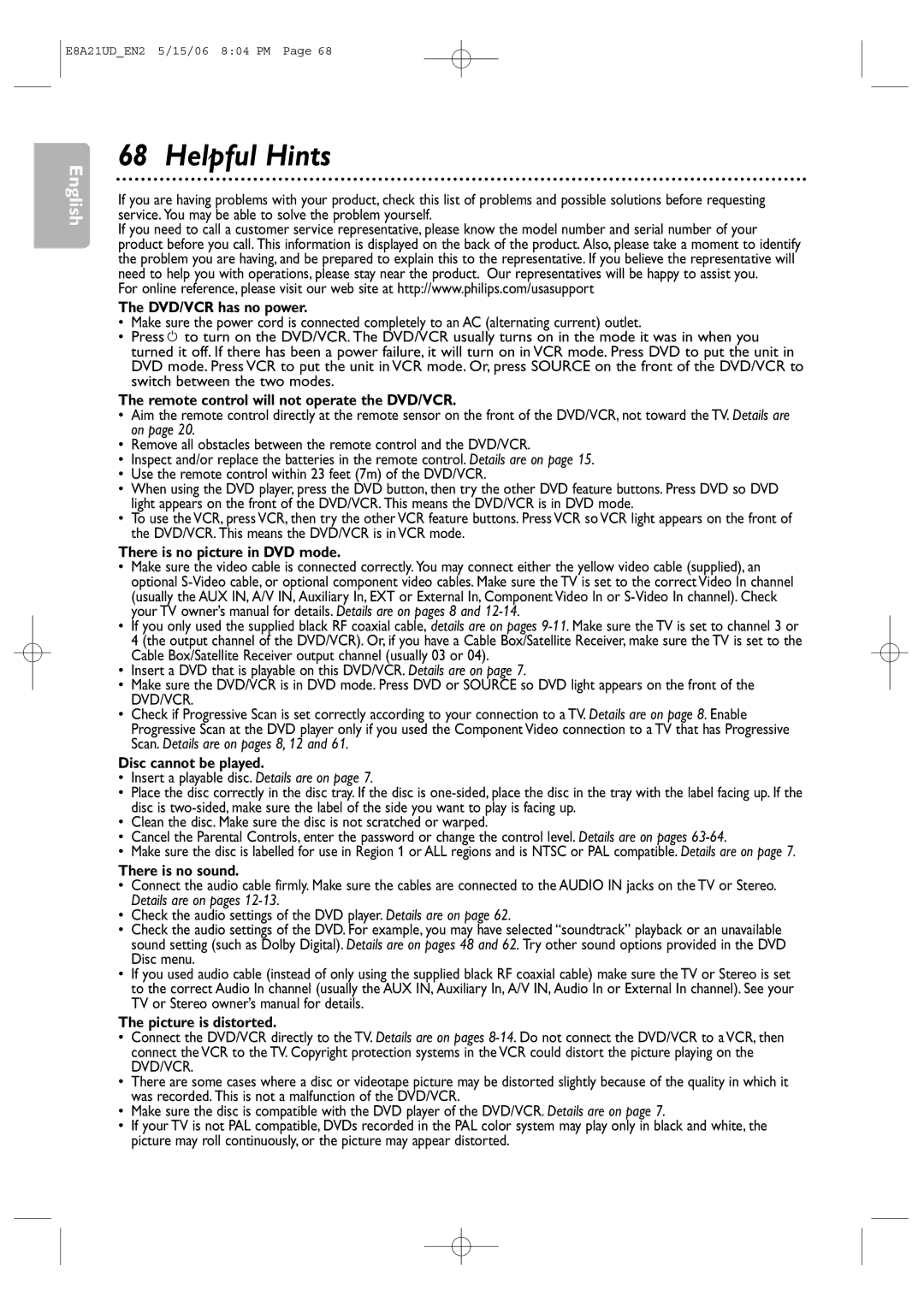
E8A21UD_EN2 5/15/06 8:04 PM Page 68
English
68 Helpful Hints
If you are having problems with your product, check this list of problems and possible solutions before requesting service. You may be able to solve the problem yourself.
If you need to call a customer service representative, please know the model number and serial number of your product before you call. This information is displayed on the back of the product. Also, please take a moment to identify the problem you are having, and be prepared to explain this to the representative. If you believe the representative will need to help you with operations, please stay near the product. Our representatives will be happy to assist you.
For online reference, please visit our web site at http://www.philips.com/usasupport
The DVD/VCR has no power.
•Make sure the power cord is connected completely to an AC (alternating current) outlet.
•Pressy to turn on the DVD/VCR. The DVD/VCR usually turns on in the mode it was in when you turned it off. If there has been a power failure, it will turn on in VCR mode. Press DVD to put the unit in DVD mode. Press VCR to put the unit in VCR mode. Or, press SOURCE on the front of the DVD/VCR to switch between the two modes.
The remote control will not operate the DVD/VCR.
•Aim the remote control directly at the remote sensor on the front of the DVD/VCR, not toward the TV. Details are on page 20.
•Remove all obstacles between the remote control and the DVD/VCR.
•Inspect and/or replace the batteries in the remote control. Details are on page 15.
•Use the remote control within 23 feet (7m) of the DVD/VCR.
•When using the DVD player, press the DVD button, then try the other DVD feature buttons. Press DVD so DVD light appears on the front of the DVD/VCR. This means the DVD/VCR is in DVD mode.
•To use the VCR, press VCR, then try the other VCR feature buttons. Press VCR so VCR light appears on the front of the DVD/VCR. This means the DVD/VCR is in VCR mode.
There is no picture in DVD mode.
•Make sure the video cable is connected correctly. You may connect either the yellow video cable (supplied), an optional
• If you only used the supplied black RF coaxial cable, details are on pages
•Insert a DVD that is playable on this DVD/VCR. Details are on page 7.
•Make sure the DVD/VCR is in DVD mode. Press DVD or SOURCE so DVD light appears on the front of the DVD/VCR.
•Check if Progressive Scan is set correctly according to your connection to a TV. Details are on page 8. Enable Progressive Scan at the DVD player only if you used the Component Video connection to a TV that has Progressive Scan. Details are on pages 8, 12 and 61.
Disc cannot be played.
•Insert a playable disc. Details are on page 7.
•Place the disc correctly in the disc tray. If the disc is
•Clean the disc. Make sure the disc is not scratched or warped.
•Cancel the Parental Controls, enter the password or change the control level. Details are on pages
•Make sure the disc is labelled for use in Region 1 or ALL regions and is NTSC or PAL compatible. Details are on page 7.
There is no sound.
•Connect the audio cable firmly. Make sure the cables are connected to the AUDIO IN jacks on the TV or Stereo. Details are on pages
•Check the audio settings of the DVD player. Details are on page 62.
•Check the audio settings of the DVD. For example, you may have selected “soundtrack” playback or an unavailable sound setting (such as Dolby Digital). Details are on pages 48 and 62. Try other sound options provided in the DVD Disc menu.
•If you used audio cable (instead of only using the supplied black RF coaxial cable) make sure the TV or Stereo is set to the correct Audio In channel (usually the AUX IN, Auxiliary In, A/V IN, Audio In or External In channel). See your TV or Stereo owner’s manual for details.
The picture is distorted.
•Connect the DVD/VCR directly to the TV. Details are on pages
•There are some cases where a disc or videotape picture may be distorted slightly because of the quality in which it was recorded. This is not a malfunction of the DVD/VCR.
•Make sure the disc is compatible with the DVD player of the DVD/VCR. Details are on page 7.
•If your TV is not PAL compatible, DVDs recorded in the PAL color system may play only in black and white, the picture may roll continuously, or the picture may appear distorted.
